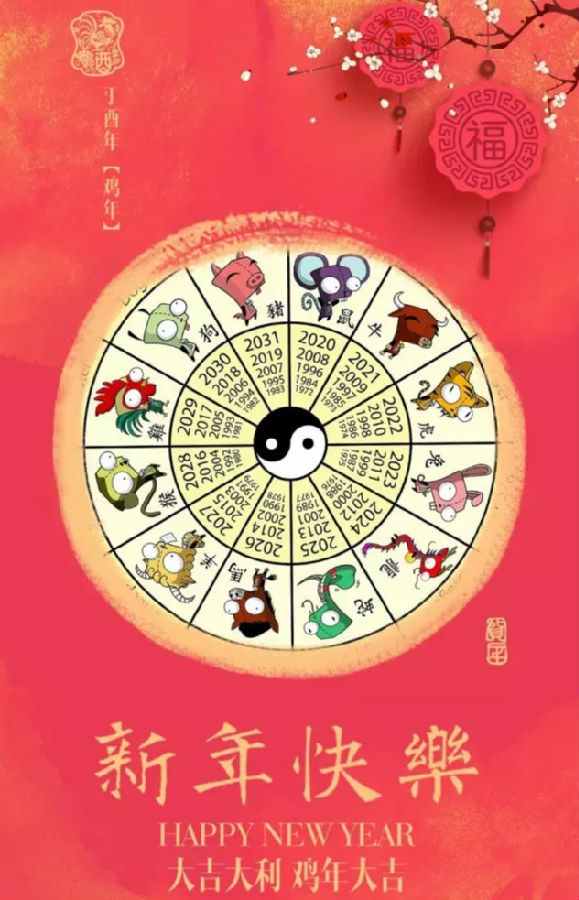Dialogue 1 Year of the Chicken or Year of the Rooster?
對話1 雞年是Chicken 還是 Rooster?
Jingjing: Long time, no see, Mark. Happy Year of the Rooster!
京晶:馬克,好久不見!雞年快樂!
Mark: It's great to see you, Jingjing. Happy New Year! Thanks for covering my extended vacation.
馬克:見到你很高興,京晶。新年快樂!謝謝在長假期間幫我代班。
Jingjing: I just hope you had a good chance to travel and relax during the holiday.
京晶:我只是希望你能利用假期好好旅游和放松一下。
Mark: For sure. By the way, I'm wondering if you think it's right to call it the year of the rooster or the year of the chicken.
馬克:那必須的。對了,我想知道你認為應該稱雞年為“the year of the rooster”還是“the year of the chicken”。
Jingjing: Well, I've heard both in English. Of course, in Chinese, it's 雞年(jīnián), which translates directly to chicken year.
京晶:哦,兩種英文說法我都聽說過。當然,中文是雞年(jīnián),直接翻譯成英文就是chicken year。
Mark: That's true for all 12 of the animals on the Chinese zodiac, isn't it? It's just the basic word for the animal.
馬克:對中國十二生肖的動物來說都是直接這樣翻譯的,不是嗎?只是翻譯成該生肖在英文中對應的簡單詞。
Jingjing: Yes. It doesn't specify male or female. 公雞 (gōngjī) is the Chinese word for rooster. But we don't say 公雞年 (gōngjīnián).
京晶:是的,并不具體指出是公的還是母的。rooster的中文是公雞 (gōngjī),但是我們并不說公雞年 (gōngjīnián)。
Mark: A lot of people think you should go with the word that sounds more majestic, like rooster, ram, or boar.
馬克:許多人認為應該使用更雄偉一點的詞,比如rooster(公雞),ram(公羊)或者boar(公豬)。
Jingjing: Don't you think so also?
京晶:難道你不也這么認為嗎?
Mark: I would, but a lot of the animals are just called by their basic names. It's kind of a stretch to look for a different word for a chicken that sounds majestic, when the same process would get people mixed up between a rat and a rabbit.
馬克:我是這樣認為的,但是很多生肖只是以簡單的名字稱呼。找一個更正式雄偉的詞來稱呼雞似乎有點言過其實,因為這樣做的話會讓人搞混鼠和兔。
Jingjing: A male rabbit is called a buck, right?
京晶:公兔在英文中是buck,對嗎?
Mark: Yeah, but nobody uses that word, unless they're breeding rabbits. If I said I saw a buck in the forest, people would think I saw a male deer.
馬克:是的,但是沒人用這個詞,除非他們是繁殖兔。如果我說我在森林里看到一只buck,人們會認為我看到的是一只公鹿。
Jingjing: So, we should just stick with the basic names for animals.
京晶:所以,我們可以只用生肖的通俗名。
Mark: Yeah. Call a chicken a chicken.
馬克:是的,稱雞為雞。

Dialogue 2 The Chinese Zodiac Abroad
對話2 外國人也知道中國十二生肖嗎?
Jingjing: I was wondering, Mark, do people outside of Asia use the Chinese zodiac very much?
京晶:馬克,我想知道亞洲之外的其他國家的人經常使用中國十二生肖嗎?
Mark: Most people know their own animal year.
馬克:大部分人知道他們自己的生肖年。
Jingjing: Do you remember when you learned yours?
京晶:你記得你是什么時候知道你的生肖年的嗎?
Mark: Yeah. I was in a Chinese restaurant in Vail, Colorado. We were waiting for our food and looking at the placemats, which had been printed with the Chinese zodiac.
馬克:記得,那時我在在科羅拉多州韋爾的一家中國餐館,我們一邊等著上餐,一邊看著餐具墊,中國十二生肖就印在餐具墊上。
Jingjing: Were you excited to learn about your animal year?
京晶:你知道了自己的生肖年時興奮嗎?
Mark: I was, because I'm a dragon. I was with my family. Some of my relatives were like, “oh, I'm a monkey,” or, “I didn't know I was a pig.”
馬克:當然,因為我屬龍。當時我和家人在一起,我的一些親戚當時都是,“噢,我是屬猴的”或者“我都不知道我是屬豬的。”
Jingjing: Hold up. Monkeys and pigs are not seen as good animals in America?
京晶:等等。猴和豬在美國不被看作好的動物嗎?
Mark: We don't have the legend of the Monkey King from Journey to the West there.
馬克:我們那里沒有西游記齊天大圣的傳說。
Jingjing: What about pigs?
京晶:那豬呢?
Mark: They're thought of as sloppy and lazy. But I understand that in China it's good fortune to be born in a year of the pig.
馬克:他們被認為是粗心和懶惰的象征。但是我知道,在中國,出生在豬年象征著有福氣。
Jingjing: You got it. You can expect to see a lot of pregnant ladies when the year of the pig rolls around.
京晶:你懂的。當豬年到時,你會看到很多孕婦。
Mark: I can picture it now: dozens of soon-to-be mothers rolling around the shopping mall.
馬克:我現在就可以想象到那場景:許多準媽媽們扎堆兒逛著商場。
Jingjing: You might steer clear of the shopping mall that year, unless you're expecting.
京晶:那一年你可能想避開商場,除非你也懷孕了。
Mark: Yeah. It'll be a good year for online shopping!
馬克:是的,那一年比較適合網購。











